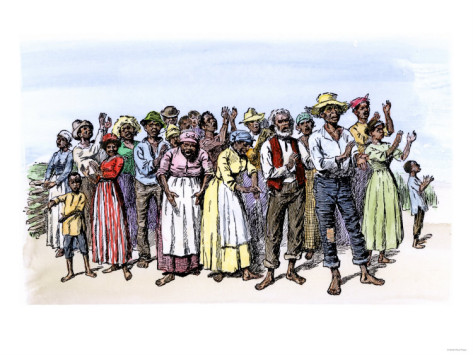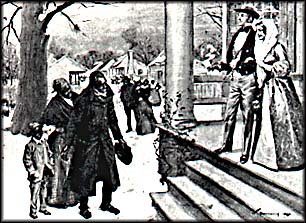
Good Morning POU!
This week we’ll look at the experiences of slaves during the holiday season, primarily Christmas Day through the first of the year.
In the dining room might be a series of flickering candles and stockings full of candy hanging on the walls. Outside, the men would gather around barrels of cider or whiskey, celebrating their week off, while the women would prepare a turkey dinner. After eating the food and drinking the liquor, the men and women would find their partners and dance to the cheerful tunes of banjoes and fiddles. Christmas cheer was especially important for these people, for they were slaves on a large southern plantation, and this would be one of the only days when they were free to celebrate as a community of families.
Yet beneath the drinks, dancing, and decorations was a darker side to the holiday. Both slaves and slave owners manipulated the Christmas holiday in their constant struggle for freedom or power. The former used Christmas to assert their basic humanity, while the latter twisted holiday traditions to prevent slave rebellion.

One of the most scathing critiques of Christmas in bondage comes from the narrative of black leader and former slave Frederick Douglass. In his narrative, Douglass wrote that Christmas was nothing more than a tool for oppression.
Douglass argued that plantation owners used the holiday season and the weeklong break from hard labor to stifle slave rebellion. Douglass, born into slavery in 1818, came of age in a slave system wealthy planters had perfected. They knew how to mold nearly every small interaction and grand institution to serve their interests. Christmas would have been no different.
As Douglass recalled, the temporary respite from hard labor allowed slaves to tolerate their condition. Masters also used the holiday more directly, encouraging slaves to binge drink hard liquor: “One plan is, to make bets on their slaves, as to who can drink the most whiskey without getting drunk; and in this way they succeed in getting whole multitudes to drink to excess.” Binge drinking not only asserted the dominance of the slave owner, but according to Douglass, it also made working in the fields more attractive: “We felt, and very properly too, that we had almost as well be slaves to man as to rum. So, when the holidays buy viagra vietnam ended, we staggered up from the filth of our wallowing, took a long breath, and marched to the field,–feeling, on the whole, rather glad to go.”

Masters relied on Christmas as a way of fracturing slave solidarity. As Christmas approached, they threatened to withhold gifts or even cancel Christmas completely. This system of holiday-based reward and punishment encouraged obedience, productivity, and disunity. Slave owners also waited until the holidays to dismantle families and sell slaves. The news that a son, daughter, or spouse was to be sold away often prompted heartbreaking acts of violence, including suicide and self-mutilation, and slave owners believed that the jovial holiday spirit could smooth the process.
Yet the slave experience during Christmas is more complex than Douglass might lead us to believe. Masters might use the holiday to reinforce their control, but slaves used Christmas in their physical, psychological, and cultural resistance to slavery.
On the most basic level, Christmas allowed slaves to endure the rigors of slavery. Even Douglass mentioned that Christmas meant gifts of food and clothes. Slaves took advantage of the free time, tending to their gardens, hunting for wild game, and crafting items for trade. Slaves also embraced Christmas for its psychological benefits. They travelled to neighboring plantations to visit friends and family, sometimes taking advantage of the lax rules of the season to stay away for weeks. As large groups came together, slaves celebrated through song and dance. These dances became a means of creating and preserving African-American culture.
,+facing+p_+23_.jpg)
Most important, slaves saw these small moments of community and joy as a demonstration of their humanity. Harriet Jones, a woman born into slavery in 1844, discussed Christmas in her memoirs. She recalled that her master helped lead the Christmas dances, calling to his slaves to swing their partners. Jones relished the opportunity to dance intimately and openly with her significant other, remembering how passionately the various couples danced. It is unclear what the observing owners thought, but many slaves saw these Christmas dances as a chance to display their romantic love in a society that otherwise disregarded and disparaged it. During the dances, men wore clean shirts and women placed ribbons in their hair. Central to the preparation was the act of removing, literally and symbolically, the confining field shoes, as the shoes were notoriously bad for dancing.
How do we reconcile Douglass’s memories with these acts of resistance? Perhaps the two accounts are not as antithetical as they seem. Christmas was an effective means of control precisely because it allowed for greater displays of resistance on one designated week a year. Ironically, occasionally affording slaves rest and freedom helped slave owners to maintain power.

